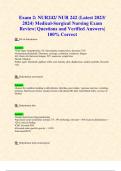Exam 2: NUR242/ NUR 242 ( Latest 2023 / 2024 ) Medical -Surgical Nursing Exam Review| Questions and Verified Answers | 100% Correct Q: S/S of dehydration Answer: •Vital signs: hyperthermia, ST, thread pulse, hypotension, decrease CVP •Neuromusculoskeletal: Dizziness, syncope, confusion, weakness, fatigue •GI: thirst, dry furrowed tongue, N/V, anorexia, weight loss •Renal: Oliguria •Other signs: Diminish capillary refill, cool clammy skin, diaphoresis, sunken eyeballs, flat neck vein Q: Dehydration assessment Answer: •Assess for condition leading to dehydration: diarrhea, poor intake, vigorous exercise, vomiting, polyuria, fluid losses (burns, trauma) clients with drains/NG tube, burns/fluid shifts, overuse of diuretic Q: Dehydration labs Answer: •Serum electrolytes (hypernatremia) •Increased serum osmolality normal 275 - 295 mOsm/kg; elevated > 295 found in dehydration; > 320 is critical finding •CBC elevated H/H •Elevated urine specific gravity > 1.030 •Increased BUN Q: Dehydration interventions/goal Answer: •Goal of interventions: replace fluid and electrolytes to achieve homeostasis •Closely monitor status and rehydration, avoid overcorrection •Monitor I/O and weight •Identify and manage cause - diarrhea, vomiting, blood loss, poor intake •Oral rehydration is priority if tolerating PO fluids Q: Dehydration priority interventions Answer: •IV fluid resuscitation/replacement, general guidelines •Hypertonic dehydration - hypotonic fluids - D5W once dextrose is metabolized; 0.45% NaCL (1/2 normal saline) •Isotonic dehydration: isotonic fluids (normal saline, lactated ringers) •Hypotonic dehydration: hypertonic fluids (3% or 5% saline solution) •Blood products in increased blood loss/trauma •Medications to treat cause: antidiarrheal, anti emetic, AB, antipyretics •Ingestion of food to replace electrolytes Q: Complications of dehydration Answer: •Hypovolemia •Hypovolemia shock •Seizures/coma •Multiorgan system failure Q: Dehydration medications Answer: Diphenoxylate with atropine Loperamide Promethazine HCL Acetaminophen Q: Causes of hypercalcemia Answer: •increased intake of calcium, antacids, thiazide, glucocorticoids, kidney disease, immobilization, calcium and vitamin D overdose, acidosis, milk alkali syndrome, bone metastasis, hyperparathyroidism Q: Causes of hypocalcemia Answer: low calcium intake, lactose intolerance, Malabsorption syndrome (crohn's disease) End stage kidney disease, diarrhea, wound drainage (especially GI) Q: Calcium Answer: 9-10.5 Q: S/S of hypocalcemia Answer: •Vital signs: SB, low hypotension, weak pulses •Assess for tetany, Chvostek sign, trousseau sign, laryngeal stridor, dysphagia, fatigue, anxiety, depression, hyperreflexia, muscle spasm numbness, tingling of extremities and around mouth Q: S/S of hypercalcemia Answer: •Vital sign, ST, HTN, bounding pulses




